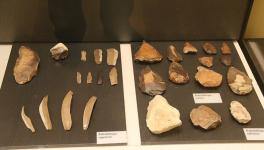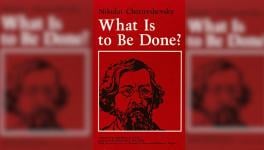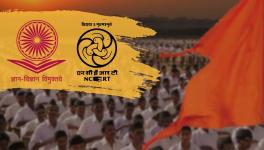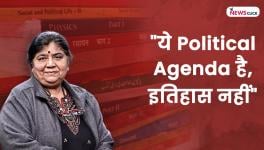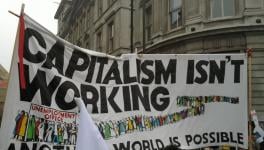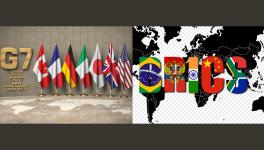The Great Archaeological Discovery of Our Time
Image Courtesy: Wikimedia Commons
The motives that drove archaeologists of the past included a thirst for glory, a taste for treasure, and a desire to enshrine a new political era with the legitimacy of the ancient past.
Gradually, over the decades leading closer to ours, the discipline matured, gaining an ethical framework, and started asking questions about the societies and lifestyles of the people who had left their traces behind. Archaeologists began to compare their evidence to how we live now and increasingly started hunting for the origins of modern-day problems, from plagues and warfare to inequality.
Archaeological research spread beyond the palaces and cities of a few civilisations to six continents, and the rapid growth of evidence in human origins produced a global outlook and a six million-year-long clock to record the gradual changes in the human story that led us to the present.
The diligent research of tens of thousands of archaeologists carefully documenting the past all over the planet has accumulated and crossed a new threshold leading to big implications: It’s socially useful information that we can plug into improving our lives.
Our sample size of this greater past dwarfs by many magnitudes what we thought history used to be. Thanks to advances in technology, the data about the human story can integrate and interact with the records we keep today.
Many modern human problems are the result of “evolutionary mismatch”—our lifestyles are at odds with the biological capacities we developed and relied on for millions of years to get here—and range from heart disease to various forms of addiction and ADHD. A synthesis of human origins research and our new understanding of human biology presents a powerful perspective and roadmap for dealing with some of our biggest challenges.
By combining that synthesis with the archaeological record’s increasingly detailed knowledge of human settlement and state formations, from its origins to the present, we can build from a universalising framework and global data set. This approach can better integrate the wider body of Indigenous knowledge and worldviews than the Western-based historical models and understanding of the human story that continues to hold sway.
One of the first to see the scale of this opportunity is archaeologist, researcher, and professor Gary M. Feinman, MacArthur Curator of Mesoamerican, Central American, and East Asian Anthropology at the Field Museum of Natural History in Chicago. Feinman and a growing cast of colleagues have turned stereotypes about Mesoamerican societies on their heads -- many were cooperative, relatively egalitarian-- and developed an impressive array of frameworks that allow us to compare different aspects of societies from various times and places, including ours.
Feinman has been a prominent advocate for developing better models to interpret the past and for the synthesis of information across time periods and regions of the planet. We are stronger when we can draw from a broader set of parameters, counterexamples, and nuances that prevent the common human instinct to take off on flights of fancy.
I thought readers could benefit from sharing our conversation about the great archaeological discovery of our time: the realisation that this new data set is a powerful engine for the betterment of humankind.
Jan Ritch-Frel: Let’s start with a great essay you wrote in 2023, “Learning from History, If We Dare.” You wrote of a “treasure trove of information that just may guide us toward better futures.” We’re in an era, thanks to accumulations of evidence and technology, where humanity has a critical mass of history at its fingertips that it has never had before. Why is this significant?
Gary M. Feinman: As deep-time historians, we have finally gotten the volume and multiple scales of data that permit comparisons across different cultural periods, over long spans of time, and diverse social formations. In a real sense, through archaeology, we can now begin to assess a truly global historical record that is not narrowly restricted to just literate societies or the European past. For a long time, the classical Mediterranean world or medieval Europe—both known from texts—were used as proxies for humanity’s past. Now, we know that is not appropriate, as our past as a species has neither been uniform nor linear.
At the same time, we now have models that help us identify and point ourselves toward understanding what underpins good governance, collective and cooperative behaviour, as well as the causes of economic inequality and their alternatives. The social sciences have finally discarded 200-year-old approaches to understanding the past, such as the idea that the nations of Europe are the pinnacle and end-point product of steady human progress. A historical framework pegged to that framework makes useful comparisons across history almost impossible.
Ritch-Frel: Do we have many examples of our leaders and governing circles daring to learn from anything other than cherry-picked history?
Feinman: The problem is that for centuries, scholars interested in drawing lessons from the historical past have looked principally to the classical world, Europe’s recent past, or progressivist models that made unwarranted assumptions about human nature writ large. Many leaders who saw history through a straw have paid a heavy price.
More problematic are the scenarios that presume humans are perpetually selfish or that our leaders are always despotic or militaristic. These scenarios ignore the nuances of human nature, which include both the potential for selfishness and the ability to cooperate with non-kin at scales unsurpassed in the animal kingdom. Human behaviour is always contingent on context, and alone, it cannot account for human history. Rather, we must look for the parameters, patterns, and variability in institutions and behaviour that account for humanity’s differences, diverse pasts, and changes.
Contrary to prevailing opinion, there is no end to the debates and lessons we can learn from history. Technologies change, but the basic socioeconomic mechanisms and relations that underpin human institutions have broad commonalities and structures. We know this in regard to scale and now another key dimension: the degree to which power is concentrated and distributed.
Of course, pure reliance on education and exposure to democratic institutions and good governance is not enough for these things to take hold. How institutions are financed makes a big difference, and if that does not change, then political realities will not either.
Ritch-Frel: Since we’ve never had so much history to learn from and make use of before, the reality is that the mechanisms for initiating better use of a more comprehensive history have to be produced. What are some of the key starting points?
Feinman: We first have to recognise that when explaining humanity’s past, history itself matters. The path dependence, or sequence of changes, and existing structures matter. In other words, the social sciences are historical sciences—like biology—but without general laws or mechanical explanations like there are in physics. Even though there are no universal laws of history, we can identify useful probabilities.
How do we do that? First, a comparative study of the past has to allow for variation in sequences, speed of development, and change. Then, as we compare different regional sequences of history, we can study the relations between historical factors and key variables under different parameters. One great advantage of history and archaeology compared to the recent past is that we know the outcomes. We already know what happened, and that gives us the opportunity to understand why.
As we build our understanding of humanity’s global past, the strength of the relationships we see between institutions and factors such as population growth, nucleation, and scale will become stronger. Only through a broad comparative lens, made possible with archaeological data, can we construct a genuinely global archive of histories and heritage.
Then there’s the social modelling question—a lot of historical error has been produced by seeing events as driven solely by the elites. High status generally may come with more clout than others have, but in social formations, there are many other groups and forces that have a hand in determining how events unfold. If we’re interested in greater accuracy, we will include the vantages of the wider population and daily life.
Institutions are part of this mix: They perform functions based on earlier embedded history that people have to contend with and sometimes reform.
Most human settlements and social formations are open—population flow and change are near-continuous. This means that membership and affiliations in our communities and “societies” are generally in flux and have mechanisms that reflect that.
Cultural groups are not homogeneous, and cultural traits do not shift in unison. Some aspects of culture, like worldviews or visions of the universe, resist change. Others, such as how people organise politically or what they do for a living, may shift more readily.
This is where it becomes so critical that we can study the past in both granular and scaled-up ways, using a range of new technologies we have available, from isotopes and DNA to satellite mapping.
The methodology of many research disciplines that use individuals as their key metric has continuously let us down the more our questions scale up—this applies to both behavioural ecology and classical economics. They are useful but conceptually inadequate when it comes to explaining the diversity and complexity of the deep past.
Ritch-Frel: Regarding the educational process for future leaders, where would you start?
Feinman: We need a curriculum for future leaders that broadens their perspective on human behaviour and the global past. If we’re going to enjoy the benefits of history, behaviour in the contemporary West should not be isolated or considered distinct from the rest. A proper dose of a synthesis of anthropology, archaeology, and history will temper the curricula that prepare future leaders in ways that dampen modernist and Eurocentric biases.
The famous Philosophy, Politics and Economics (PPE) courses at Oxford and Cambridge, which have produced almost all the UK prime ministers for many decades, and the Grand Strategy courses taught at the elite campuses of the United States, are deeply imbued in these theories and presumptions.
Ritch-Frel: Do you think the PPE and the Grand Strategy crowd know they’re holding onto an obsolete and reductive bag and will embrace history and biological sciences, or will this have to be a knife fight in the alley?
Feinman: In so many ways, recent policies and beliefs regarding inequality, globalism, democracy, and migration have been birthed from disciplines like economics, politics, and law, which are grounded in Eurocentric ideas and assumptions. These biases are not surprising since Western social scientific thought grew hand in hand with Euro-American colonialism and contemporary paths of economic development.
But now, our mission is to disentangle and refine our conceptual frames, drawing on and broadening it based on what we have learned. The data we have collected in archaeology, anthropology, and history demand an episode of “destructive science,” a new conceptual development that aligns with what we know, in which we expand and integrate theoretical ideas drawn from economics and politics. And we can temper them with the diversity in practices and institutions that have been documented by archaeologists, historians, and anthropologists.
Jan Ritch-Frel is the executive director of the Independent Media Institute and a co-founder of the Human Bridges project.
Source: Human Bridges
Credit Line: This article was produced by Human Bridges, a project of the Independent Media Institute.
Get the latest reports & analysis with people's perspective on Protests, movements & deep analytical videos, discussions of the current affairs in your Telegram app. Subscribe to NewsClick's Telegram channel & get Real-Time updates on stories, as they get published on our website.










